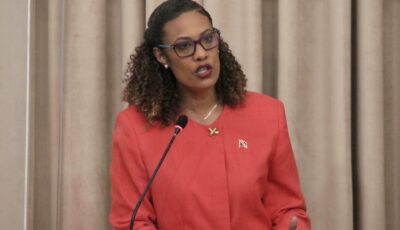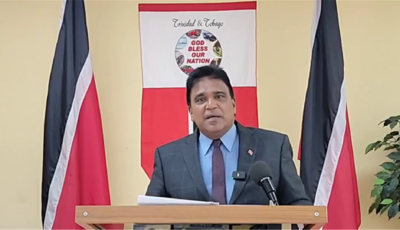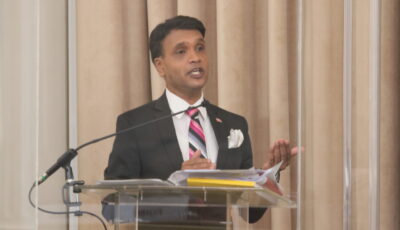HEADLINES
Commentary
Rowley strenuously objected to the construction of Penal-Debe UWI Campus
The media is reporting that the UWI Penal-Debe Campus, built during the People’s Partnership Administration continues to sit empty and has never
Posted On 30 Oct 2023
Blighted WGTL Project continues to haunt PNM
That World Gas-to-Liquids project is another of the many PNM scandals and failed projects which has cost taxpayers billions of dollars! And it is
Posted On 22 Jun 2023
Who financing Balisier House?
Ferdinand Ferreira, a founding member of the People’s National Movement (PNM), is quoted in the media as saying that the party has always
Posted On 03 Apr 2023
UNC SENATORS DEFENDED THE PARTY WELL TODAY
Today, the Opposition UNC Senators defended themselves and the Party well from the frivolous, anti-democratic motion by Senator Anthony Viera.
Posted On 22 Feb 2022
COVID WORKERS FIGHTING A WAR WITHOUT THEIR PROPER WEAPONS
We congratulate Kamla Persad-Bissessar on her success in forcing the Government to conduct an inquiry into the handling of covid. We take this
Posted On 20 Feb 2022
Letters
For fools rush in where angels fear to tread
The National Security Minister’s recent unrestrained language and conduct towards judges and unjustified criticisms of their judicial functions
Posted On 14 May 2023
Seek a fresh mandate
I recently read in one of the daily newspapers that Minister of National Security Fitzgerald Hinds said that 70% of society wants to see him
Posted On 27 Dec 2022
Don’t Blame God for Rowley’s Dotishness
Prime Minister Keith Rowley at the PNM convention on December 4, 2022, announces a National Day of Prayer. He said the country must come together
Posted On 16 Dec 2022
Keith Rowley has betrayed the sanctity of Parliament
Dear Editor, The revelation by the Commissioner of Police that the emails which Keith Rowley, then Opposition Leader read in our nations
Posted On 19 Jul 2019
T&T owes Kamla a debt of gratitude
Kamla Persad-Bissessar did what many were not expecting… she and her MPs voted unanimously with the Government to ensure passage of the Civil
Posted On 09 Apr 2019
Press Releases
Tancoo: Flooding imminent as Government fails to act
After a couple days of scattered “April showers” earlier this week, MP for Oropouche West, Dave Tancoo is again warning that severe flooding in
Posted On 06 Apr 2024
MP Khadijah Ameen wants justice for Kiss Driver’s death
Member of Parliament for St. Augustine, Ms. Khadijah Ameen is calling for justice for the death of Kiss delivery driver, Neil Ballai. Ballai was
Posted On 06 Apr 2024
UNC’s Persistent Pressure Forces Rowley Gov’t to Release 2024 EBC Report
On the heels of intense, consistent pressure from the UNC over their highly questionable refusal to lay the 2024 EBC Boundaries Report in
Posted On 06 Apr 2024
Moonilal: Hinds Fails Fire Service, Lives at Risk as Equipment Crumbles
The collapse of the Trinidad and Tobago Fire Services is another crushing indictment on the spectacularly failed Fitzgerald Hinds as Minister of
Posted On 05 Apr 2024
Padarath: Gov’t Electricity Rate Hike “Unbearable Burden”
Princes Town MP, Barry Padarath said that the contents of a report in yesterday’s Business Guardian headlined “RIC Recommends
Posted On 05 Apr 2024
Speeches
Tancoo: calls on Imbert to have a heart and indemnify the population
Today we come to you to shine some light on a very worrying development that has happened in the past few days. I am sure many of you saw or
Posted On 08 Sep 2021
Rowley’s Mad Power Grab in Tobago
My friends, we are seeing a government that is in freefall – in every single sector. Health, National Security, the business sector. And what
Posted On 16 Feb 2021
Presentation of UNC general election candidates 2020
T&T family! UNC family! It is my absolute pleasure to speak with you today, as we get ready for the sweeping victory that is to come on
Posted On 19 Jul 2020
Kamla: My vision is to build an intelligent nation
“ON THE BALLOT” UNC VIRTUAL MEETING (June 25, 2020) Introduction Good evening and thank you for joining us once again as we continue to set the
Posted On 26 Jun 2020
MNF – Kamla: There is hope
Introduction Good evening T&T! Good evening UNC family! It is good to be back! 2020 we are ready to rumble! Are you ready? Even though it’s
Posted On 11 Mar 2020
Copyright © - 2023 United National Congress







ILP Trying To Stay In The Game In T&T Politics
How times change!
There is a popular saying that a day can be an eternity in politics and if you look at the politics of Trinidad and Tobago today you would see the evidence manifest itself in the fortunes of the Independent Liberal Party (ILP), which was born in 2013 following the refusal of the United National Congress (UNC) to nominate Jack Warner as its candidate in the Chaguanas West by election.
For those who are unfamiliar with the long and complicated story, let me try to tell it as simply as I could.
Mr. Warner was a senior minister in the People’s Partnership (PP) government but in April 2013 he resigned from cabinet following the publication of a report that alleged that he was involved in certain shady dealings while he was a top executive of the world football body, FIFA, charges that he has refuted. He also charged that a “cabal” in the government had influenced the Prime Minister to accept his resignation.
He also resigned as chairman of the UNC and as the MP for Chaguanas West, declaring that UNC was in his DNA and that he would seek the nomination for the by election triggered by his sudden resignation. The party didn’t nominate him and he reacted by forming the ILP, nominating himself as the candidate and defeating the UNC’s Khadijah Ameen to regain the seat in Parliament, this time as an opposition MP.
His party quickly gained national attention and attracted a large membership, reaching more than 100,000 according to his accounts.
But politics changes like the weather and the ILP’s popularity quickly waned, with a disappointing result in the 2013 local government election in which the party won only three of the 136 seats, to be followed by a loss in a by election in St Joseph. This was followed by a string of resignations including the leader of his party’s youth arm and ILP chairman, Robin Montano.
More recently Warner’s founding colleague, Anna Deonarine-Rampersad, walked away and complained that the ILP had lost its moorings and had become a satellite of the opposition People’s National Movement (PNM). She quit shortly after former Senate Vice President Lyndira Oudit became political leader of the ILP.
But then in a surprise move two Sundays ago Oudit quit her post, saying she was nothing but a figurehead leader; the party’s executive handed the leadership to Warner.
And on Saturday the ILP announced that it would have candidates in only 23 seats in the 2015 general election, 21 of which are currently held by members of the PP coalition.
The ILP decided to steer clear of some PNM and UNC strongholds. For example, the party said it won’t contest Arouca, San Fernando East, La Brea, Point Fortin, two of the three Diego Martin Seats and four of the five seats in the Port of Spain area. On the UNC/PP side it is not fighting in Oropouche East and West, Couva South, Naparima and Princes Town.
This strategy could stump the average political commentator but there is nothing startling about what the party is planning. The ILP knows that it no longer has the support or membership that it counted on in 2013. There are reports of an exodus of UNC members who had flocked to the party primarily because of Warner’s track record in the PP government and as an effective MP while serving with the UNC.
Those leaving – including people like Montano and Denonarine-Rampersad – were saying Warner was no longer the person they knew and many of the grassroots UNC faithful decided they would be more comfortable back home in the UNC.
Saturday’s announcement would likely trigger more speculation of a PNM/ILP alliance especially looking at how the ILP has lined up the constituencies with the party going after 21 PP incumbents and only two from the PNM. The story is going to get even more traction because of the announcement by both Keith Rowley and Colm Imbert that the PNM is no longer holding firm to the Patrick Manning policy of “winning alone and losing alone”, which deprived Manning of the government in 1995.
Warner is no fool. He understands where the PNM truly stands. While he might have an arrangement to enter into a coalition with the PNM the message from that party’s leadership is clear that Warner would be welcome only if the PNM cannot win a majority and only if Warner can deliver critical seats to put the PNM in office.
Warner knows that winning government alone in no longer possible so he is going after his best option, which is to try to create a political situation where neither the PNM nor the PP wins a majority. If he could do that and win enough support to become the kingmaker with one or more seats, then he wins and the two dominant political groups would have to dance according to the music his band is playing.
How possible is that?
A day is an eternity in politics. We’ll just have to wait and see.
Share this:
Like this:
Serious crime has decreased under Partnership
Kamla in a very good place
Commentary
Rowley strenuously objected to the construction of Penal-Debe UWI Campus
Blighted WGTL Project continues to haunt PNM
Who financing Balisier House?
UNC SENATORS DEFENDED THE PARTY WELL TODAY
COVID WORKERS FIGHTING A WAR WITHOUT THEIR PROPER WEAPONS